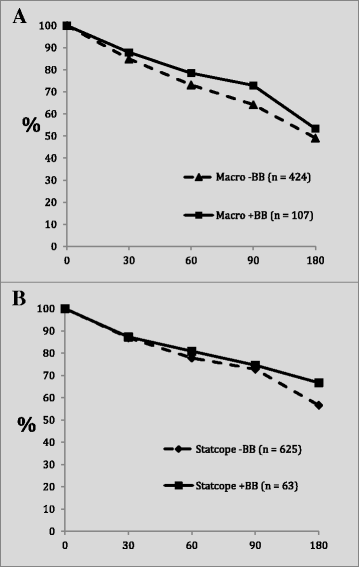Effect of beta-blockers on exacerbation rate and lung function in chronic obstructive pulmonary disease (COPD)
- PMID: 28629419
- PMCID: PMC5477165
- DOI: 10.1186/s12931-017-0609-7
Effect of beta-blockers on exacerbation rate and lung function in chronic obstructive pulmonary disease (COPD)
Abstract
Background: Beta-blockers are commonly prescribed for patients with cardiovascular disease. Providers have been wary of treating chronic obstructive pulmonary disease (COPD) patients with beta-blockers due to concern for bronchospasm, but retrospective studies have shown that cardio-selective beta-blockers are safe in COPD and possibly beneficial. However, these benefits may reflect symptom improvements due to the cardiac effects of the medication. The purpose of this study is to evaluate associations between beta-blocker use and both exacerbation rates and longitudinal measures of lung function in two well-characterized COPD cohorts.
Methods: We retrospectively analyzed 1219 participants with over 180 days of follow up from the STATCOPE trial, which excluded most cardiac comorbidities, and from the placebo arm of the MACRO trial. Primary endpoints were exacerbation rates per person-year and change in spirometry over time in association with beta blocker use.
Results: Overall 13.9% (170/1219) of participants reported taking beta-blockers at enrollment. We found no statistically significant differences in exacerbation rates with respect to beta-blocker use regardless of the prevalence of cardiac comorbidities. In the MACRO cohort, patients taking beta-blockers had an exacerbation rate of 1.72/person-year versus a rate of 1.71/person-year in patients not taking beta-blockers. In the STATCOPE cohort, patients taking beta-blockers had an exacerbation rate of 1.14/person-year. Patients without beta-blockers had an exacerbation rate of 1.34/person-year. We found no detrimental effect of beta blockers with respect to change in lung function over time.
Conclusion: We found no evidence that beta-blocker use was unsafe or associated with worse pulmonary outcomes in study participants with moderate to severe COPD.
Keywords: Beta-blocker; COPD; Exacerbation.
Figures
References
Publication types
MeSH terms
Substances
LinkOut - more resources
Full Text Sources
Other Literature Sources
Medical


